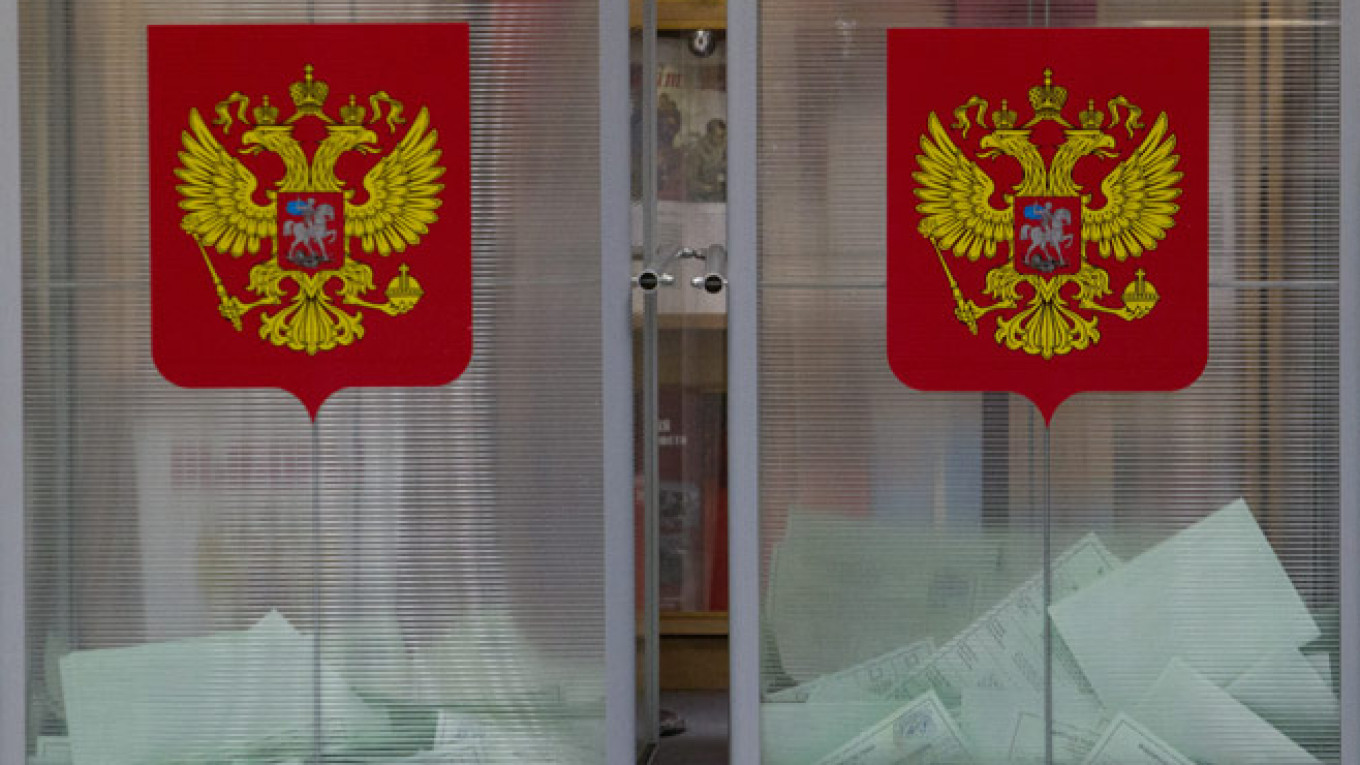Multiple violations were registered by independent elections watchdogs during Sunday's regional elections across Russia, and in the most drastic development, the office of an observers' organization was raided by police who said they had reason to believe it was a murder scene.
The Central Elections Commission (CEC) said it had received only five complaints.
More than 189,000 candidates ran for different posts in Russian regions ranging from regional governors to municipal deputies on Sunday, according to a statement by the CEC. Eighty-three of Russia's 85 regions held elections on Sunday, including Crimea, which is recognized by most international states as being part of Ukraine.
These are the last elections before those for the State Duma, the lower chamber of the Russian parliament, which are scheduled to take place one year from now. The last State Duma elections in 2011 were followed by allegations of widespread rigging that provoked a wave of mass anti-government protests across Russia.
Sunday's votes were also the first elections since the onset of an economic crisis triggered by a plunge in oil prices and Western sanctions over Ukraine.
According to preliminary results published by the CEC, members of the pro-Kremlin ruling United Russia party were set to win gubernatorial elections in the four Far East regions — Russia's earliest time zones — garnering more than 50 percent of the vote in each of them. No other preliminary results were available by the time of publication.
Election observers had catalogued more than 1,500 violations according to a "Map of Violations" project published by the independent elections watchdog Golos.
In the town of Abinsk in the Krasnodar region, an unidentified woman stuffed the ballot box with ballots, one observer reported, adding that the police had not attempted to detain the woman.
In the city of Nizhny Novgorod, a local man, Adik Shakirov, was offered 500 rubles ($7) to go and vote for a designated candidate, according to an interview with Shakirov recorded by another Golos observer.
Most of the campaigns were heavily dominated by pro-Kremlin candidates. Only one region — Kostroma — went ahead with the participation of opposition members openly critical of Putin, putting the region east of Moscow in the media spotlight.
Ilya Yashin, a close ally of the opposition leader Boris Nemtsov who was shot dead in central Moscow earlier this year, headed the list of the People's Freedom Party (Parnas) for the elections in the Kostroma region. Parnas had also submitted candidates for elections in three other regions, but they were refused registration on technical pretexts.
On Sunday, the offices of the Otkrytye Vybory (Open Elections) organization in Kostroma were stormed by police who said that the premises had to be vacated as they were a crime scene where a murder had been committed, according to a live video broadcast. Elections observers and the media were forced out of the building, despite multiple complaints.
In addition, filled-in ballots were discovered in booths at an election precinct in the Kostroma region, observer Anastasia Zotova wrote on her Facebook account, posting accompanying pictures of the completed ballots.
The real Russian opposition that is fiercely critical of the Kremlin — as opposed to several alternative parties that toe the government line — has been marginalized to the fringes of Russian politics in the last decade. Most Russians know little about opposition leaders, or associate them with the turbulent 1990s that are widely regarded as the most troubled period in recent Russian history.
While the posts of 21 regional heads were up for election, with the final results unknown by the time of publication, the heads of three other regions were elected by the local legislative assemblies from a list of candidates compiled by President Vladimir Putin — an alternative system to public elections introduced following the return of gubernatorial elections in 2012.
In two of the three regions voting under that system Sunday — the Khanty-Mansiisk autonomous district and the republic of North Ossetia — acting governors from United Russia were confirmed in their posts by the local legislature. The results of the third — the Yamal-Nenets autonomous district — were not known by the time of publication.
Most of the leading candidates in the public elections did not publish manifestos. Only five acting governors published original electoral manifestos, the Petersburg Politics think tank found in the run-up to the vote.
The manifestos that were published mostly focused on previous achievements and promised stability instead of development, the think tank found.
"Some of the manifestos are written in such a way as though the candidates have already won the elections," the report said.
Contact the author at i.nechepurenko@imedia.ru
A Message from The Moscow Times:
Dear readers,
We are facing unprecedented challenges. Russia's Prosecutor General's Office has designated The Moscow Times as an "undesirable" organization, criminalizing our work and putting our staff at risk of prosecution. This follows our earlier unjust labeling as a "foreign agent."
These actions are direct attempts to silence independent journalism in Russia. The authorities claim our work "discredits the decisions of the Russian leadership." We see things differently: we strive to provide accurate, unbiased reporting on Russia.
We, the journalists of The Moscow Times, refuse to be silenced. But to continue our work, we need your help.
Your support, no matter how small, makes a world of difference. If you can, please support us monthly starting from just $2. It's quick to set up, and every contribution makes a significant impact.
By supporting The Moscow Times, you're defending open, independent journalism in the face of repression. Thank you for standing with us.
Remind me later.


